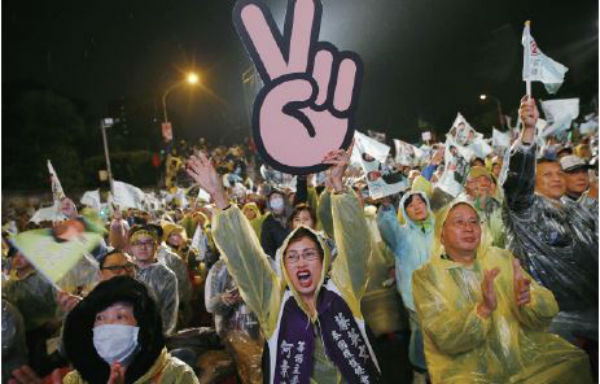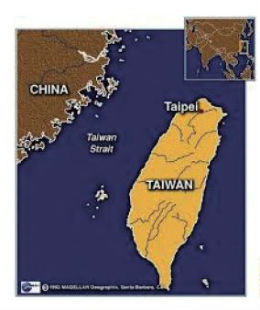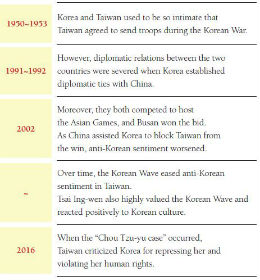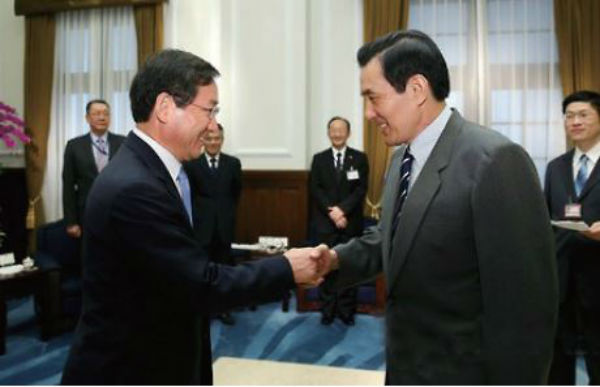The day when Tsai Ing-wen was elected President of Taiwan, she announced that it is a just right that people wave their national flag, and everyone should respect those rights. Her remark targeted China and its reaction to the “Chou Tzu-yu case.” Taiwan and China have been in a special relationship called the “Cross-Strait Relationship” across the Taiwan Strait. And until now, Taiwan had not publicly criticized China’s oppression. However, since Tsai Ing-wen’s party advocates independence from China, there will be some diplomatic changes resulting from her election. It will also affect Korea, which established diplomatic ties with Taiwan. In this article, the Sungkyun Times (SKT) introduces Tsai Ing-wen, the changes her election will bring, and the proper attitudes Korea should take.
Tsai Ing-wen: Who Is She?

Tsai Ing-wen was elected as Taiwan’s president with 56.1 percent of the vote on January 16, 2016. Her election has significant meanings. First, she is the first female president in Taiwan’s history. This election also made her one of the few female world leaders, along with Germany’s Chancellor Angela Merkel and South Korean President Park Geun-hye. Moreover, it means the transfer of power from the Kuomintang (KMT) to the Democratic Progressive Party (DPP). The most signi_cant difference between the two is the stance toward China. The DPP supports Taiwanese independence, while the KMT hopes to maintain the status quo by recovering the Cross-Strait Relationship. Since Tsai Ing-wen lost the election in 2012, this transfer of power happened for the _rst time in eight years. For these reasons, many people look forward to the day she takes of_ce as Taiwan’s president.
Queen of Elections Tsai Ing-wen won the election through her own efforts without any assistance from her background. She is rather unusual because she is from minority backgrounds: the child of a concubine and a scholar, lacking experience in politics. Her party, the DPP, lost political power in 2008 when it lost the presidential election to the KMT. The corruption scandal of Chen Shui-bian worsened her party’s situation. Although her party was in the worst circumstances, she has won elections seven times in the past three years. Being elected with overwhelming support this time, she proved her reputation as the “Queen of Elections.”
Taiwan’s Big Sister The Taiwanese think of Tsai Ing-wen as a natural, easygoing woman. Her hairstyle has remained the same throughout her political career, and she has canvassed for an election without wearing any makeup. Moreover, because she never married, she used to be called “Taiwan’s big sister.” She uploaded pictures she took with her two cats onto a Social Network Service (SNS), which brought feelings of familiarity to the people. In addition to these friendly behaviors, she also carried out her election campaign with the people. Unlike other candidates who received political funds from large companies, she collected political funds from piggy banks she passed to people and from profits earned in souvenir shops that sold products related to her.
Wild Leopard Contrary to her easygoing image, she is famous for her aggressive political tendencies. Her family argued anticommunism for generations and opposed the KMT. Moreover, they were advocates of the “Taiwan Consensus,” which supports the idea that Taiwan’s future should be decided by Taiwanese people through a democratic process. Due to the in_uence from her family, she has a _rm character and tendency to stand against the opposite side. A popular Taiwanese journalist said, “She can make male politicians step back with her strong con_dence and obsession to her specialties.”
How Will Tsai Ing-wen Change the World?
Taiwan

Tsai Ing-wen placed her priority on national economic development in order to revive the middle class and small businesses. In recent years, Taiwanese seniors demeaned young people as the “strawberry generation” for having no endurance for social oppression and hardships. This is because the younger generation has gone through the economic depression and now fears for their future, while the older generation was able to accumulate wealth during past economic growth. Furthermore, the wage level did not change for almost eight years; housing prices continuously rose; and the government neglected small businesses. Tsai Ing-wen figured out her constituents’ worries and promised to construct 200,000 rental housing units, enact new minimum wage laws, and raise wages. Her pledge led the young generation to strongly support her, and these actions are expected to help resolve the severe discord between generations by reducing the anxiety of Taiwanese youth.
China

Shortly after the election, Tsai Ing- wen said, “Repression will destroy the stable relations between mainland China and Taiwan.” Originally, they were one country. Then, a civil war broke out between two political parties, which made China and Taiwan oppose each other. After Taiwan withdrew from the United Nations in 1971, it was not accepted as a formal state and was subject to restriction by China when using symbols of an independent nation. In 1992, they decided on the “1992 Consensus,” in which both governments agreed to the “One-China Principle” and claimed sovereignty. Although they agreed on the principles, neither recognized the other’s legitimacy. This complicated situation is called the “Cross- Strait Relationship” across the Taiwan Strait. Since her party has traditionally favored formal independence from mainland China for the island, big changes are expected compared to the past. To achieve independence, however, Taiwan has to reduce its degree of dependency on China. Taiwan currently exports 45 percent of its Gross Domestic Product (GDP) to China. Until last year, under the “Economic Cooperation Framework Agreement (ECFA)” with China, the KMT abolished tariff walls between the two countries as part of a pro-Chinese policy. This created many “Chiwan” businesses that took advantage of the technical skills of Taiwan and the huge market of China. However, this measure aggravated Taiwan’s economy by relocating jobs from Taiwan to China, causing deindustrialization on the island. Therefore, Tsai Ing-wen plans to diversify businesses within the country and develop a high-tech industry called “Smart Taiwan,” while departing from the previous regime’s pro-China policy.
United States Another method Ing-wen devised in order to reduce the degree of dependency on China is through developing a diplomatic relationship with the United States (US) while having distance from China. One of her key presidential campaign pledges was to strengthen military cooperation with the US. This enables Taiwan to discuss foreign security policy with the US. In fact, she proceeded her political moves for external relations by meeting US dignitaries, including former Secretary of State William Burns. The US can further help her policy work, by inhibiting the growth of China’s military strength and diplomacy. Ing-wen also promised to join the Trans-Pacific Partnership (TPP) and expand Free Trade Agreements (FTAs). The TPP is an agreement led by the US to hold China in check. Therefore, membership in this alliance helps reduce the importance of trade with China and increase trade with member countries of the TPP. Some people worry that this movement will increase tension across the Taiwan Strait, but Tsai Ing-wen firmly believes that this is necessary for the Taiwanese in order to regain their rights.
How Should Korea React? Relationship between Korea and Taiwan

Necessity of Wise Diplomacy Because Korea has maintained friendly relations with both Taiwan and China, Korea should cope with the changes through sensible diplomacy. Currently, Korea tends to enforce pro-China policies to develop its economy and resolve North Korea’s nuclear issue. However, Korea has to choose between the US and China, since the US, who has considerable tension with China, spurred movement to improve relations with Taiwan. One example is the TPP. When the TPP goes into effect, it will become a massive economic block, which would account for 40 percent of global GDP. If Taiwan joins the TPP before Korea does, it will be more difficult for Korea to join since membership requires approval of all member countries. If Korea fails to join the TPP, exports will be reduced by 1 percent, and GDP will decrease by 0.3 percent. For this reason, Korea should contemplate the relationship between China and the US. If conflicts between two countries aggravate due to the election of Tsai Ing-wen, Korea’s diplomatic position might lose the path to head. So far, the Korean government considered relations with China more important than relations with Taiwan. Thus, few trade agreements exist between Korea and Taiwan. However, Taiwan is one of Korea’s major trading partners, and their trade volume measures 30 billion dollars per year. The two countries even awarded an aeronautical agreement last year to increase trades. Tsai Ing-wen also brings positive effects because she has shown friendly attitudes toward Korea.

There is a quote that states, “The whole nation should be a diplomat.” This means that every single person can represent one’s own country. Nowadays, even the slightest changes to international relations affect many countries because they are all connected to one another like a spider web. In this situation, not only diplomatic policies implemented by the government, but also the attitudes of the people are important. Therefore, our matter of interest should not be limited to domestic concerns, but we should care about global issues and international situations as well.
